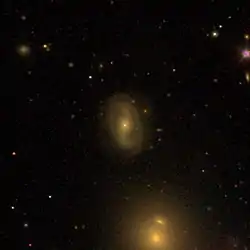| NGC 998 | |
|---|---|
 SDSS image of NGC 998 | |
| Observation data (J2000 epoch) | |
| Constellation | Cetus |
| Right ascension | 02h 37m 16.50891s[1] |
| Declination | +07° 20′ 08.7169″[1] |
| Redshift | 0.02184[2] |
| Heliocentric radial velocity | 6476 km/s[2] |
| Distance | 303.7 ± 21.4 Mly (93.11 ± 6.56 Mpc)[3] |
| Apparent magnitude (B) | 14.6[2] |
| Absolute magnitude (V) | -23.46 +/- 0.51[2] |
| Characteristics | |
| Type | S?[2] |
| Other designations | |
| MCG +01-07-015, PGC 9934[2] | |
NGC 998 is a spiral galaxy in the constellation Cetus. It is estimated to be 294 million light years from the Milky Way and has a diameter of approximately 90,000 ly. Together with NGC 997, it forms a gravitationally bound pair of galaxies. NGC 998 was discovered by astronomer Albert Marth on 10 November 1863 using a 48-inch telescope.[4][5][6]
See also
References
- 1 2 Brown, A. G. A.; et al. (Gaia collaboration) (August 2018). "Gaia Data Release 2: Summary of the contents and survey properties". Astronomy & Astrophysics. 616. A1. arXiv:1804.09365. Bibcode:2018A&A...616A...1G. doi:10.1051/0004-6361/201833051.
- 1 2 3 4 5 6 "NGC 998". SIMBAD. Centre de données astronomiques de Strasbourg. Retrieved 2020-06-03.
- ↑ "Results for object NGC 0998 (NGC 998)". NASA/IPAC Extragalactic Database. California Institute of Technology. Retrieved 2020-06-03.
- ↑ "Revised NGC Data for NGC 998". spider.seds.org. Retrieved 2020-03-24.
- ↑ "Your NED Search Results". ned.ipac.caltech.edu. Retrieved 2020-03-24.
- ↑ Ford, Dominic. "The galaxy NGC 998 - In-The-Sky.org". in-the-sky.org. Retrieved 2020-03-24.
External links
 Media related to NGC 998 at Wikimedia Commons
Media related to NGC 998 at Wikimedia Commons
This article is issued from Wikipedia. The text is licensed under Creative Commons - Attribution - Sharealike. Additional terms may apply for the media files.